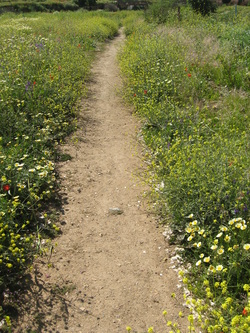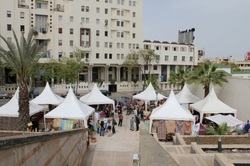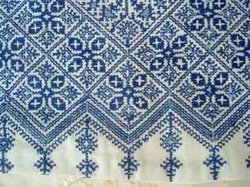Lately it has felt like this is literally what is expected of me. Not just by my Cooperative and counterpart, but by my landlord, Peace Corps, the guy running the hanut next door, everyone. I need to learn the Moroccan equivalent for Rome wasn’t built in a day.
This month I have been working on emailing small e-commerce clothing businesses that buy from indie groups. I put together this website and blog in order to showcase their work and have been facebooking and twittering to create some sort of “online presence”. The issues with this are two fold: To make this sustainable we first need to see some sort of success (which takes time) and secondly need to buy a computer and internet access for the cooperative (currently I work on my personal netbook which will return home with me at the end of my service.) and subsequently train several girls on how to use it and most importantly how to find and conduct business on it. Now, I am working everyday to make it successful by seeking out businesses and finding opportunities. Recently I’ve begun working on procuring a grant in order to buy the necessary overhead to maintain this as a sustainable option. Quickly I realized the fact that the money just isn’t there. Not in the grant fund set up by the Peace Corps and not in independent grants either. This leaves two options: fundraising or financing it through the funds of the cooperative. Personally, I don’t feel comfortable fund raising for a For Profit organization who could quite possibly have the funds available for a computer and internet but are unwilling to use it. So at this point I am left with the option of convincing my counterpart that buying a computer would be a good business idea for us. Which makes the success of my current work all the more important. Of course the computer sitting idle in the next room (paid for by the Peace Corps but belonging to a separate cooperative) makes my Counterpart rightfully skeptical and wonder why the Peace Corps won’t buy her one too. So although I see convincing my Counterpart to spend the limited funds of the Cooperative on a risky and expensive piece of equipment as extremely difficult, I also see it as a very important step in developing a market outside of Taza and perhaps even the best option of all- because we all know that when we buy something with our own money it tends to hold a special value above the amount you paid. It represents the effort you put into making that money. Wish me luck!
This month I have been working on emailing small e-commerce clothing businesses that buy from indie groups. I put together this website and blog in order to showcase their work and have been facebooking and twittering to create some sort of “online presence”. The issues with this are two fold: To make this sustainable we first need to see some sort of success (which takes time) and secondly need to buy a computer and internet access for the cooperative (currently I work on my personal netbook which will return home with me at the end of my service.) and subsequently train several girls on how to use it and most importantly how to find and conduct business on it. Now, I am working everyday to make it successful by seeking out businesses and finding opportunities. Recently I’ve begun working on procuring a grant in order to buy the necessary overhead to maintain this as a sustainable option. Quickly I realized the fact that the money just isn’t there. Not in the grant fund set up by the Peace Corps and not in independent grants either. This leaves two options: fundraising or financing it through the funds of the cooperative. Personally, I don’t feel comfortable fund raising for a For Profit organization who could quite possibly have the funds available for a computer and internet but are unwilling to use it. So at this point I am left with the option of convincing my counterpart that buying a computer would be a good business idea for us. Which makes the success of my current work all the more important. Of course the computer sitting idle in the next room (paid for by the Peace Corps but belonging to a separate cooperative) makes my Counterpart rightfully skeptical and wonder why the Peace Corps won’t buy her one too. So although I see convincing my Counterpart to spend the limited funds of the Cooperative on a risky and expensive piece of equipment as extremely difficult, I also see it as a very important step in developing a market outside of Taza and perhaps even the best option of all- because we all know that when we buy something with our own money it tends to hold a special value above the amount you paid. It represents the effort you put into making that money. Wish me luck!


